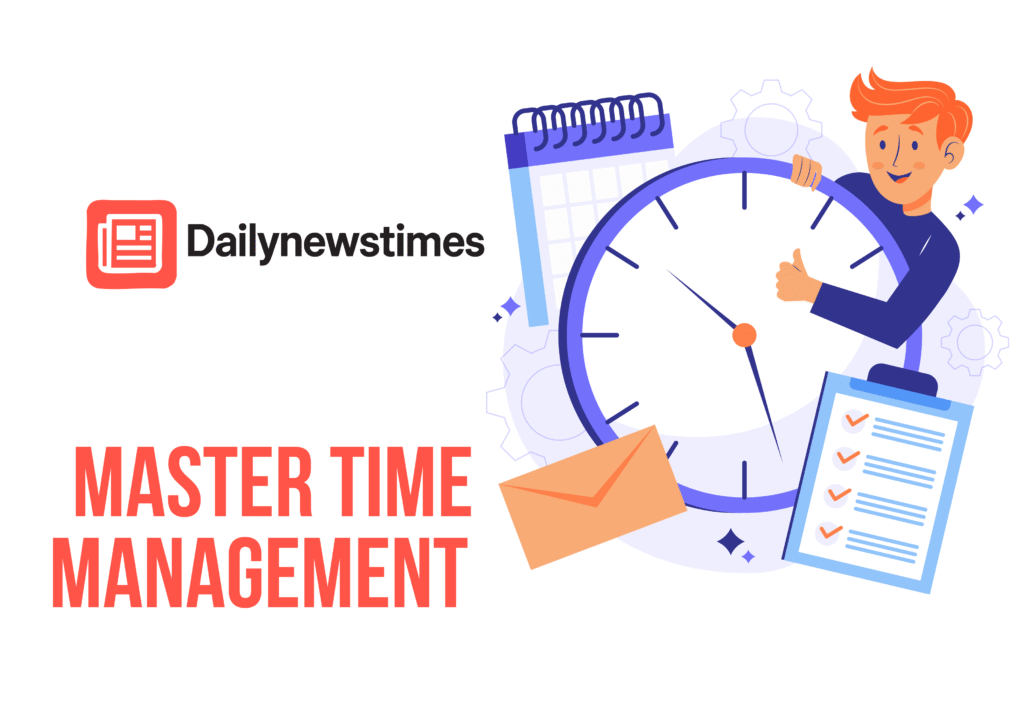Time management ain’t just a buzzword—it’s a real game-changer in work, studies, and life. In today’s fast-paced world, how you use your 24 hours matters more than ever. Poor planning leads to stress missed deadlines, and burnout. But with effective Time Management techniques, you can boost productivity, improve mental health, and even reclaim leisure time. Let’s break down why it matters and how to master it.
What Is Time Management
Simply put, time management is how we structure our tasks and activities within the fixed 24‑hour day. It’s not about gaining more time, but about managing yourself in relation to time, as the University of Georgia Extension explains—it’s like budgeting your minutes to do what matters most.
Why It Matters
Boost Productivity & Reduce Stress
Studies show that time management training increases perceived control over time, reduces stress and enhances productivity, according to NCPERS. For example, workers receiving such training were rated more productive by managers, and felt less stressed after completing structured programs.
Better Academic Outcomes
College research indicates strong links between good time planning reduced procrastination, and higher grades, as reported by the ERIC Institute of Education Sciences.
Improved Work-Life Balance
When we organize time better we gain space for exercise, hobbies, and quality connections—improving wellbeing overall, supported again by UGA Extension and ERIC.
Proven Time Management Strategies
1. Keep a Time Log
Record tasks in 15-minute intervals for a week to see where your time goes and identify wasted moments (UGA Extension).
2. Set Priorities
Use the Eisenhower Matrix: focus on tasks that are important but not urgent, delaying or delegating the rest (UGA Extension).
3. Time Blocking
Divide your day into chunks dedicating separate blocks for focused work and breaks. Cal Newport notes people complete up to 53% more tasks this way (Wikipedia).
4. Pomodoro Technique
Work deep for 25 minutes then take a 5-minute break. This method improves concentration and combats fatigue (Verywell Mind).
5. Schedule Focused Sessions
Slot tough tasks when you’re most alert—mornings for many—and outline “focus blocks” with no distractions (Tennessee.gov, MyHours).
6. Plan Realistic Timeframes
Avoid over-optimism—if a report usually takes 30 minutes don’t schedule it in 15. SSA’s guidance emphasizes realistic self-assessment (SSA ChooseWork).
Real‑World Examples & Case Studies
- A NCBI study on college students connected self-control and reduced phone distraction with better study engagement.
- An Indian hospitality study found strong ties between time discipline and employee productivity.
- Researchers in STEM noted calendar use significantly boosts task completion.
Additional Tips & Comparisons
Digital Timers & Apps
Use trackers like Toggl or Clockify to monitor time usage, and stay honest with yourself.
Delegate & Batch Tasks
Government career advice suggests delegating where possible and batch-scheduling similar tasks (e.g. emails) to maintain focus (UGA Extension).
Regular Breaks
Research by the Draugiem Group (via Glamour) shows people work 52 minutes then break for 17 minutes—producing major productivity boosts. Similar ideas are seen in Nordic “five-hour” workday trials (Wired).
Time of Day Awareness
Track when you’re most productive, and focus high-cognitive tasks during those hours.
Know Your Triggers
Avoid places or people that always cause distraction. Set your phone on silent or leave it in another room.
Weekly Reviews
Spend 30 mins every weekend to look back at your time use. Did your plans work out? What needs fixing?
FAQ Section
Q: How long do I need to track my time?
Just 1–2 weeks with a 15-minute log gives insight into habits and time leaks.
Q: Is time management more about planning or doing?
Both. Planning sets the structure, while disciplined execution keeps you on track.
Q: What if my job doesn’t allow focus blocks?
Try micro-boosts—even 15 minutes of undisturbed work improves momentum.
Q: Does scheduling breaks really help?
Yes—science shows short breaks reset attention and improve long-term concentration.
Conclusion and Action Plan
Time Management is more than a productivity hack—it’s a lifestyle that improves stress, performance and balance. By tracking time, prioritizing with smart frameworks, and structuring your work rhythm, you can turn chaotic days into satisfying routines.
Your 5‑Day Action Plan:
- Log your time for 3 days in 15-minute blocks
- Classify tasks using the Eisenhower Matrix
- Set 2–3 daily focus blocks using timeblocking
- Use Pomodoro intervals during these blocks
- Review at end of week tweak your schedule accordingly
Start with small steps, stay adaptable and let time management transform how you work—and live.

